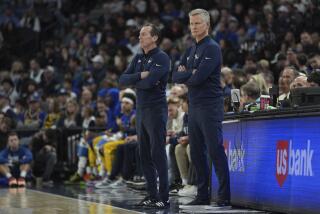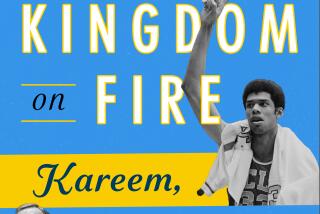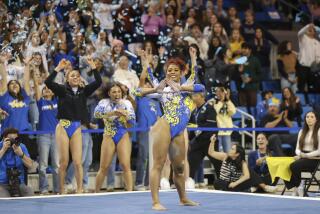PATIENT POSITION : Injured Nets Learning Lessons From Willis Reed
- Share via
EAST RUTHERFORD, N.J. — The New Jersey Nets had heard the stories about Willis Reed.
About how, as a player, he had won championship games by sheer force of personality. About how he could scatter entire teams when he got riled.
But the Willis Reed the Nets feared and the one they got were two different people.
“Everyone expected him to throw chairs and rant and rave,” star forward Buck Williams said. “He’s a big man and his past preceded him here. But he’s been real patient and understanding.”
The Nets, 12-42 when Reed arrived as coach on Feb. 29, have won five of their first nine games, six of which were on the road.
One of the road victories was at Boston Garden, snapping the Celtics’ regular-season home winning streak against Eastern Conference opponents at 67.
“With Willis, we’re motivated to put out,” veteran guard Otis Birdsong said. “We’re getting to know Willis better, and he’s getting to know us better. With time, it will mesh.”
After 11 years as a coach--including head jobs with the New York Knicks and at Creighton University and posts as an assistant at St. John’s, Atlanta and Sacramento--Reed knows he’s not a miracle worker.
“It doesn’t happen very often that you fall into a great job as a NBA head coach,” he said. “Pat Riley and K.C. Jones were very lucky with the Lakers and Celtics, but most of the time you’re going into a losing situation.
“I was looking to get involved in a team with future upsides. Not that I think this team will play over .500 ball next season, but its record is not as bad as it seems.”
Reed says that injuries--the Nets are approaching 300 player-games lost, tops in the NBA--have ruined New Jersey this season.
“You look at the effect an injury to Magic Johnson has had on a great team like the Lakers, then if you look at a team that doesn’t have the talent of the Celtics or Lakers, and injuries are going to have a traumatic effect,” Reed said.
The Nets have made a good start toward accomplishing Reed’s stated goal of winning half of the 28 games they had left when he took over.
At the time, considering the Nets’ record, that goal seemed impossible, but for several reasons, it doesn’t now.
In three straight victories at home, the Nets allowed an average of 79.7 points, 24.9 fewer than their defensive allotment before Reed.
The biggest individual improvement seen under Reed has been 7-foot center Tim McCormick.
Before Reed arrived, McCormick was averaging 8.8 points and less than six rebounds and had not scored more than 18 points in a game all season.
Since Feb. 29, McCormick exceeded 18 points in five of his first nine games and averaged 18.4 points and 8.2 rebounds.
“I’ve given him a lot of minutes, and I’ve got him working on certain moves, and I see him trying those things in games,” Reed said. “He’s the kind of guy who wants to improve, and generally, highly motivated players are the ones who eventually are the most successful because they take advice and use it.”
“I’m very impressed with Willis as a coach,” McCormick said. “He has real respect for the players because he’s been through the wars. He’s doesn’t overcoach or give too much advice.”
Reed, who led the Knicks to NBA championships in 1970 and 1973 and was a seven-time All-Star as a player, faced other problems that he hasn’t had to fully address in his first two weeks as coach.
One is his first cousin, forward Orlando Woolridge, who was admitted to a hospital for treatment of cocaine dependency a week before Reed was hired.
Reed said Woolridge, the son of Reed’s father’s sister, will have to be treated like any other player if Nets management agrees to let him return from rehabilitation.
“If he needs a hug, I’ll hug him; if he needs a kick in the butt, I’ll do that,” Reed said the day he was hired. He added, two weeks later, “I treat everyone that way.”
Reed said he and Woolridge are far closer than most first cousins. Woolridge’s family lived next door to Reed’s in Lillie, La., “and when I went off to college, he took my place at the table.”
Irrespective of the Nets’ poor record is their poor fan following. Even when they were a playoff team with a winning record, their crowds were probably the quietest and certainly the least partisan in the league.
Reed, one of the most popular players ever on a team whose home court is less than 10 miles away, recognizes the problem.
“It will take time to build a following in New Jersey,” he said. “I have no miracle scheme to make it happen. I loved the Knicks, but I can’t root for them anymore. Many Knicks fans are Willis Reed fans, even though I’m working for the Nets. Somewhere along the line, some of them will become Nets fans.”
More to Read
Go beyond the scoreboard
Get the latest on L.A.'s teams in the daily Sports Report newsletter.
You may occasionally receive promotional content from the Los Angeles Times.










